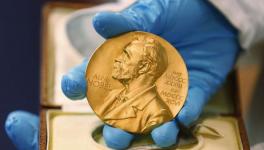Nobel Prize in Physics 2020 Awarded for Black Hole Research
Image Courtesy: nobelprize.org
The 2020 Nobel Prize in Physics has been awarded to three scientists for their research on Black Hole formation and a discovery of the supermassive black hole at the centre of our galaxy.
The Physics Nobel is divided as “one half awarded to Roger Penrose for his discovery that Black Hole formation is a robust prediction of the general theory of relativity and the other half jointly to Andrea Ghez and Reinhard Genzel for the discovery of a supermassive compact object at the centre of our galaxy”---reads the Press Release of the Nobel Society.
Black Holes still remain something of an enigma, nevertheless, years of deliberate efforts have led physicists and astronomers to peep into the mysterious object, through which, even light can not pass. In general, black holes are formed when stars collapse. This collapse results in massive explosions and the formation of a celestial object that has massive gravity and whatever comes within its proximity cannot escape it, not even light. And for this reason, black holes are invisible.
Sir Roger Penrose, a mathematical physicist based currently in University of Oxford showed that black hole formation is an inevitable consequence of the General Theory of Relativity formulated by Albert Einstein. Ironically, Einstein believed that black holes could not exist in reality. Penrose developed innovative mathematical techniques that helped him conclude that black hole formation is a reality and it emanates from Einstein’s theory. Penrose’s groundbreaking paper with his mathematical brilliance was published in 1965 which would have surprised Einstein as he had said in a paper published in 1939 that black holes are far from reality.
Later on, Penrose collaborated with another genius, Stephen Hawking and developed new ideas about gravitational singularity. In theory, gravitational singularity is the point of infinite density that can be found at the centre of the black holes.
Prof. Genzel is the director of Max Planck Institute for Extraterrestrial Physics. He, along with Prof Andrea Ghez of University of California, Los Angeles, developed remarkable ways of manoeuvring telescopes which could detect a black hole at the centre of our galaxy, the Milky way. Genzel and Ghez viewed our galaxy with telescopes and by studying motions of stars they discovered a supermassive object at the centre of the Milky way. This supermassive object is believed to be nothing other than a huge black hole and is named Sagittarius A*. This supermassive black hole has a mass equal to the mass of about 4 million suns put together.
Andrea Ghez is the fourth woman to have won the Physics Nobel Prize. In a statement, Ghez remarked, “I hope I can inspire other young women into the field. It is a field that has so many pleasures, and if you are passionate about the science there is so much that can be done.”
Roger Penrose, an octogenarian, is still engaged voraciously in research. His remarks on receiving the prestigious prize reflects it when he said, “In some ways it is a distraction, I hate to say this,” adding that he had been making the most of lockdown to develop new ideas. “I always thought it is a good thing not to win the Nobel prize too early, because if you get it too early, that is what you are thought of,” he further said.
Get the latest reports & analysis with people's perspective on Protests, movements & deep analytical videos, discussions of the current affairs in your Telegram app. Subscribe to NewsClick's Telegram channel & get Real-Time updates on stories, as they get published on our website.




















